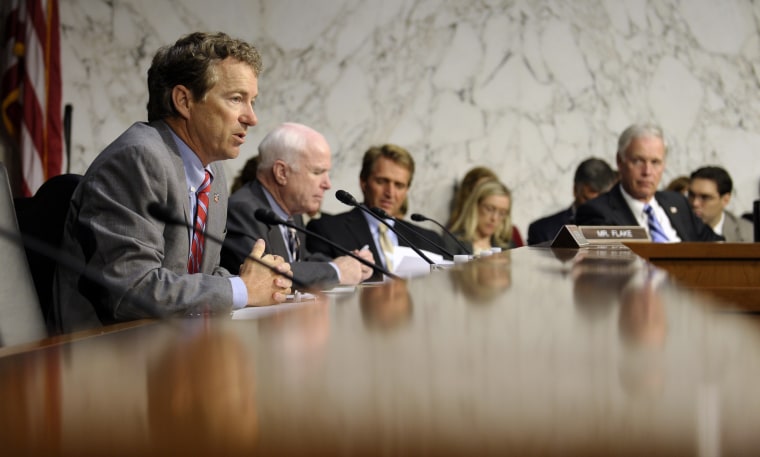When a fight over foreign policy breaks out between Republican Sens. Rand Paul, John McCain, and Lindsey Graham, knowing who to root for is a real challenge. Between them, the GOP lawmakers have been so wrong about so much, so often, that when there's a dispute, it's tempting to hope they all lose.
But their ongoing argument is interesting for one unexpected reason.
Let's first set the stage. The hawkish, McCain/Graham wing of the Republican Party has made no secret of its concerns about Rand Paul's presidential candidacy. The Kentucky senator, eager to push back, told a New Hampshire audience over the weekend, "There's a group of folks in our party who would have troops in six countries right now, maybe more." It was an uncharacteristic understatement for Paul -- McCain wants military confrontations in way more than six countries.
Nevertheless, McCain was irritated by Paul's criticism, telling Fox News this week, "He just doesn't understand. He has displayed this kind of naivete since he came to the Senate." Graham echoed the sentiment on msnbc yesterday.
All of which led to Rand Paul's amazing new talking point.
"This comes from a group of people wrong about every policy issue over the last two decades," the Kentucky Republican said in an interview with Fox News, touting his credentials as the "one standing up to President Obama." "And these people are essentially the lapdogs for President Obama and I think they're sensitive about that," he said.
Paul added, in reference to his GOP foreign-policy critics, "They supported Hillary Clinton's war in Libya; they supported President Obama's bombing of Assad; they also support President Obama's foreign aid to countries that hate us. So if there is anyone who is most opposed to President Obama's foreign policy, it's me. People who call loudest to criticize me are great proponents of President Obama's foreign policy -- they just want to do it 10 times over."
Throughout the Obama era, the Republican Party's loudest voices on foreign policy have condemned the White House, not just for being too liberal, but for being something they perceive as far worse: mushy, passive, and reluctant to launch invasions. House Speaker John Boehner (R-Ohio) recently whined, "The world is starving for American leadership, but America has an anti-war president."
Neoconservatives in Congress (John McCain, Lindsey Graham, et al) and neoconservatives outside of Congress (Dick Cheney, Bill Kristol, et al) have come to dominate the Republican foreign policy mindset, and they haven't been shy about expressing their bitter contempt of President Obama. They want a White House that will start new wars, while prolonging old wars, and they see Obama doing neither.
And for Rand Paul, this creates a challenge. He wants to reject Obama's foreign policy and the neocons' foreign policy, without embracing explicit isolationism. Yesterday, the senator rolled out his apparent solution: Obama is aligned with the neoconservatives.
For those of us who've paid attention to current events, it may seem as if folks like McCain and Graham reject the president's foreign policy, but as far as Rand Paul is concerned, we just haven't been paying close enough attention -- Obama, Hillary Clinton, McCain, and Graham are all on the same side.
In recent months, Rand Paul has slowly abandoned his principles, adopting a far more hawkish posture on international affairs in the hopes of blurring the lines of division within the GOP. For example, the Kentucky Republican, all of a sudden, wants more defense spending and more strikes against ISIS.
But yesterday, he seemed to shift postures again. Instead of positioning himself as part of his party's foreign-policy mainstream, Rand Paul now seems to believe his party's foreign-policy mainstream is too conservative -- just like Obama's approach to international affairs.
To put it mildly, it's a tough sell. Paul's most loyal adherents will probably find this persuasive, but for most GOP voters, the idea that John McCain and President Obama share a foreign-policy worldview seems literally unbelievable.
